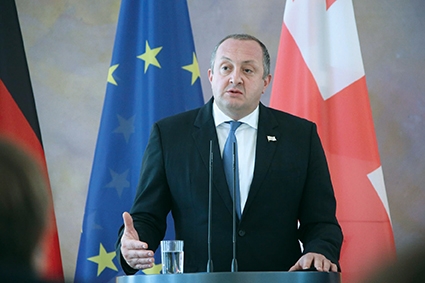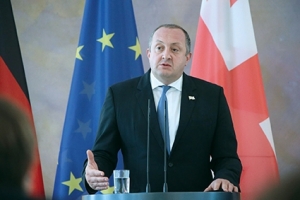Drawing to an Uninspiring Close
Op-Ed
The Georgian President will no longer nominate the Chairman of the Supreme Court and will most likely pass his last official responsibility on to the Minister of Justice, Tea Tsulukiani. His presidency ends with this, a sort of uninspired finale, looking just as the forecasts of the political experts said it would, those experts who used to say that Margvelashvili’s input would be limited to his ability to “talk well on TV.”
Five years ago, when Prime Minister Ivanishvili nominated then-Minister of Education Giorgi Margvelashvili as the presidential candidate of the ruling party, he stressed that the latter possessed important skills other than talking nicely. His background was connected to the NGO sector, like that of Saakashvili, and, most importantly, he was from the same social circle, the one that came to the fore after the Rose Revolution. These factors were decisive for Ivanishvili, who wanted his presidential candidate’s style to resonate with that of the notorious Saakashvili and the rest of the Georgian beau monde. Ivanishvili was always sensitive about the issue of “provincialism,” which is now hurtful for the Georgian Dream too.
Although Margvelashvili did not live up to Ivanishvili’s expectations in some ways, he did turn out to be the sort of president that not only Ivanishvili, but any informal ruler might only dream of. During the five years of presidency, he has never created any “real” problems for his “boss,” aside from some presidential vetoes or residing in the Presidential Residence, which don’t really matter. Margvelashvili put on the mantle of the “hand-shaker at the formal meetings” and never opposed the party in any of the critical instants. Once, there was a moment when even the slightest action from President Margvelashvili could have been enough to lose the Georgian Dream its parliamentary dominance, and turn Ivanishvili’s majority into that of Margvelashvili’s, a moment when the country could have ended up with a coalitional government – but no, Margvelashvili did not take the step, nor did he agree to pardon Ivane Merabishvili or Bacho Akhalaia, which would also have resulted in a twist of the political agenda of the country.
‘Actions speak louder than Words’ goes the saying, as well as the motto of the UNM, but five years have revealed that Margvelashvili was good only at the latter. He spoke a lot about the new Chairman of the Supreme Court, about the overall improvement of the justice system, but alas, nothing happened. It all ends with an unsurprising finale – Margvelashvili refused to nominate the Chief Justice of the country. The duality of his attitudes isn’t new: Margvelashvili begins political battles, but never sees them to an end, leaving the battlefield midway or announcing capitulation. The ability to “talk” is no mediocre skill for a politician, especially in Georgia, but obviously it isn’t enough for the President, as other skills are vital. As expert Gia Khukhashvili concluded: “His authority will expire soon, and it seems he has no clear idea what to do next: to remain in politics or leave it forever. Either decision, especially when made by the President, needs a gracious wrapping. Margvelashvili is failing at that too. In short, he is lost.”
While Margvelashvili remains silent and refrains from explaining his decision to society, representatives of both the ruling party and the opposition describe him as an irresponsible and weak public figure. But the most important is yet to come – according to the new edition of the Constitution, if the current president does not nominate a candidate for the position of Chairman of the Supreme Court, an edited document will come into force right after the presidential elections which states that the Council of Justice will choose and nominate the candidate for approval to Parliament instead.
By Zaza Jgarkava












